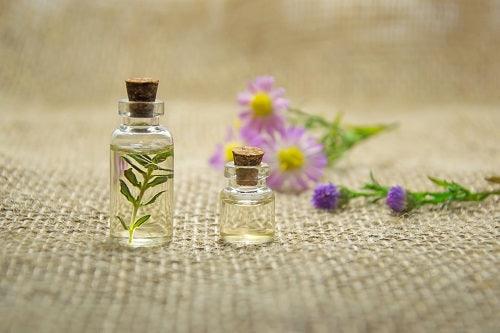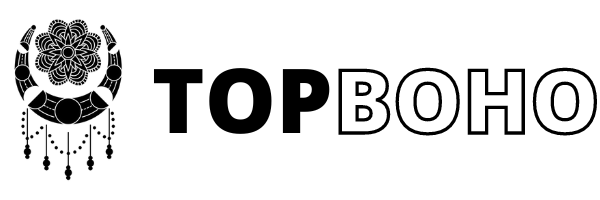
The Ultimate Guide To Essential Oils and Their Health Benefits
Top Boho ShopShare
Essential oils are concentrated plant extracts. They can have many health benefits, depending on how you use them. This is a guide to our top 10 common essential oils and their uses.

1. Lavender Oil
Lavender is a common herb used for medicinal and therapeutic purposes. It is said to help with stress, pain and sleep and before antiseptics were discovered it was also used as a cleaning agent.
To use lavender effectively you can:
- Put a few drops on your pillow before you go to bed to help with sleep.
- Apply lavender oil to affected areas for acne, eczema, to help treat blemishes and ease inflammation.
- Lavender can function as a pain reliever and anti-inflammatory because the oil contains linalyl acetate linalool and polysaccharides, try aromatherapy with 2 percent lavender essential oil that is diluted in water to help ease pain or for help with arthritis.
- Studies suggest lavender essential oil may be effective in inhibiting the growth of certain types of fungus. Try applying a little to help with fungus issues such as athletes foot and ringworm.
- There are many studies that suggest lavender can help ease anxiety, stress and depression. either by inhaling the essential oil or using it for reflexology massage treatments.
You can purchase lavender as an essential oil, tea, capsules or as a plant.

2. Tea Tree Oil
Tea tree oil has several uses for healthy skin, hair and nails. It can be used as an antiseptic, antimicrobial or antifungal as it contains terpinen-4-ol which is known to kill certain bacteria, viruses, and fungi.
Tea tree oil can be used for:
- Hand Sanitizer - add tea tree oil to hand washes or mix with aloe vera gel to kill bacteria on your hands.
- Insect Repellant - tea tree oil can be used to keep ants off of produce or as an effective mosquito repellant.
- Natural Deodorant - The oil contains compounds that fight bacteria responsible for body odor. It can be used to make a safe and effective deodorant.
- Antiseptic and wound healing (for minor cuts and scrapes) - to use tea tree oil as an antiseptic and to help heal a minor wound faster you can mix with coconut oil (one drop of tea tree to one teaspoon of coconut oil) and apply a small amount to a cleaned cut or scrape.
- Fight Acne - as some forms of acne are caused by bacteria, diluted tea tree oil can be used to treat acne blemishes.
- Treat Fungal Nail Infection - Tea tree oil has been shown to help get rid of nail fungus when used alone or in combination with other natural remedies, with fewer side effects than traditional medications.
- All -Purpose Cleaner - Diluted tea tree oil will sanitize surfaces without leaving traces of chemicals you wouldn’t want your family members or pets coming in contact with.
- Control Dandruff - Adding tea tree oil to shampoo has been found to reduce dandruff.

3. Peppermint Oil
Peppermint is an aromatic herb from the mint family. The main chemical components of peppermint oil are menthol and menthone. It has a variety of uses including:
- Treating IBS and other GI conditions - Peppermint oil capsules are said to relax and smooth muscles of the GI tract, have an anti-inflammatory effect, affect the types of bacteria that naturally live in the GI tract and decrease pain sensation in the GI tract.
- Easing Headache Pain - Wintergreen oil and menthol have been used to remedy pain from tension headaches, migraine headaches, and other causes when applied in the nose.
- Clearing a stuffed up nose - applying a small amount under your nose by can help in opening your nasal passages so you can breathe easier.
- Antibacterial - Peppermint oil can help fight against some bacteria.
Aromatherapy or topical use of diluted essential peppermint oil can have significant benefits with little risk. But be aware that peppermint aromatherapy can be toxic to pets.

4. Eucalyptus Oil
The sweet and soft aroma of Eucalyptus essential oil is best known for reducing coughs and congestion. However, it has a number of uses and benefits, including:
- Clear your chest - Eucalyptus oil can help clear mucus from your chest. Inhaling vapor made with the essential oil or using a rub made from the oil can loosen mucus so that when you do cough, it’s expelled.
- Insect repellant - Brand's such as Repel and Off! use oil of lemon eucalyptus to keep the pests away.
- Soothe cold sores - The anti-inflammatory properties of eucalyptus can ease symptoms of herpes. Applying eucalyptus oil to a cold sore may reduce pain and speed up the healing process.
- Ease joint pain - many over-the- counter creams and ointments used to soothe pain from conditions like osteoarthritis and rheumatoid arthritis contain this essential oil.

5. Lemon Oil
Extracted from the peel of lemons, lemon oil can be diffused into the air or applied topically to your skin with a carrier oil.
- Treating Acne & Acne Scars - Diluted lemon oil has astringent and antimicrobial. Together, these properties can potentially reduce inflammation and P. acnes, the bacteria that causes inflammatory acne. Apply a diluted version to acne or scars or add to your facial wash.
- Mood lifting and energizing - adding a few drops of lemon oil to your bath and help enhance your mood and leave you feeling less fatigued.
Since lemon oil can potentially dry out your skin, you may want to do a patch test and try this method once a day to start. Discontinue using it entirely if you experience redness and irritation.

6. Orange Oil
Orange essential oil can be diffused into the air, topically on the skin (with a carrier oil) or even used as a natural cleaner in your home. It is known to kill bacteria, reduce anxiety and even reduce pain. Some common uses are:
- Anxiety and Stress Relief - Aromatherapy with orange essential oil appears to reduce symptoms of anxiety and stress.
- Pain Relief - Small studies have indicated that using orange essential oil topically or for aromatherapy may help with short-term pain.
- Anticancer & Antioxidant Activity - Studies have indicated that orange essential oil or its components can inhibit the growth and lead to cell death in some cultured cancer cell lines due to it being rich in limonene.

7. Rosemary Oil
Although rosemary is best known as a food seasoning, it is one of the most popular aromatic and medicinal plants worldwide. Here are some of its most popular uses:
- Improving brain function - some studies have shown that breathing rosemary oil may help you focus and remember information. It may also aid the memory of Alzheimer patients, but more research is needed.
- Stimulate hair growth - Rosemary oil treats androgenetic alopecia, patchy hair loss, or alopecia areata by preventing a byproduct of testosterone from attacking your hair follicles.
- Mild pain reliever - rosemary oil has been used in folk medicine as a pain reliever.
- Repel blood sucking insects - rosemary can repel blood sucking insects such as mosquitos and ticks.
- Increase circulation - may help by expanding your blood vessels, thereby warming your blood so that it reaches your fingers and toes more easily.

8. Bergamot Oil
Bergamot essential oil is a hybrid combination oil from oranges and lemons. It can be used as a massage oil or body lotion (when mixed with carrier oil such as coconut oil or mineral oil, do not use directly on the skin). Benefits of Bergamot oil include:
- Stress reduction, by signaling the brain to release dopamine and serotonin.
- Reduces pain and inflammation, due to it containing both linalool and carvacrol which have analgesic, anticonvulsant, and anti-inflammatory capabilities.
- Hair softener and help with irritated scalp - mix a few drops with your shampoo to soften and tame curls and help with an irritated scalp.
- Acne and skin treatment - due to it's anti-inflammatory properties it can help get rid of painful cysts and spots.

9. Chamomile Oil
There are 2 different types of chamomile oil - Roman and German. While both provide many health benefits, German chamomile is higher in chamazulene, an active ingredient that’s thought to give chamomile its health benefits. Some uses of Chamomile essential oil include:
- Digestive upset, such as indigestion, nausea, or gas
- Wound healing, including ulcers and sores
- Anxiety relief
- Easing skin conditions like eczema or rashes
- Anti-inflammation and pain relief for conditions like back pain, neuralgia, or arthritis
- Promoting sleep
You can inhale the oil by using it in a diffuser, apply it on your skin with a carrier oil, or add a few drops to your bath.

10. Cedarwood Oil
Cedarwood essential oil has wide applications in aromatherapy as well as natural perfumery. It is considered to be one of the earliest incense materials. The calming aroma of Cedarwood is believed to be associated with the energy centeredness and abundance. Along as a natural perfume Cedarwood essential oil can be used for:
- Pesticide - it is found that Cedarwood oil is good for repelling ants and ticks.
- Pain relief - can bring down pain, swelling, and inflammation.
- Improved sleep - Cedarwood essential oil is said to be a sedative and can help lengthen sleeping times.
- Antibacterial properties - has antibiotic activity against some bacteria, including E-coli.
With any essential oils, follow these safety precautions when using:
- Don’t apply undiluted essential oil to your skin.
- Keep the oil away from your eyes.
- Store the oil out of reach of children and pets.
- If you use the oil for aromatherapy, make sure that the space you’re in is ventilated well.
- If you’re pregnant, breastfeeding, or taking prescription medications, speak to your doctor before using orange essential oil.
While research suggests there are health benefits, the FDA doesn’t monitor or regulate the purity or quality of essential oils. Always do a patch test before trying a new essential oil. And, please be careful to not ingest any essential oils!
